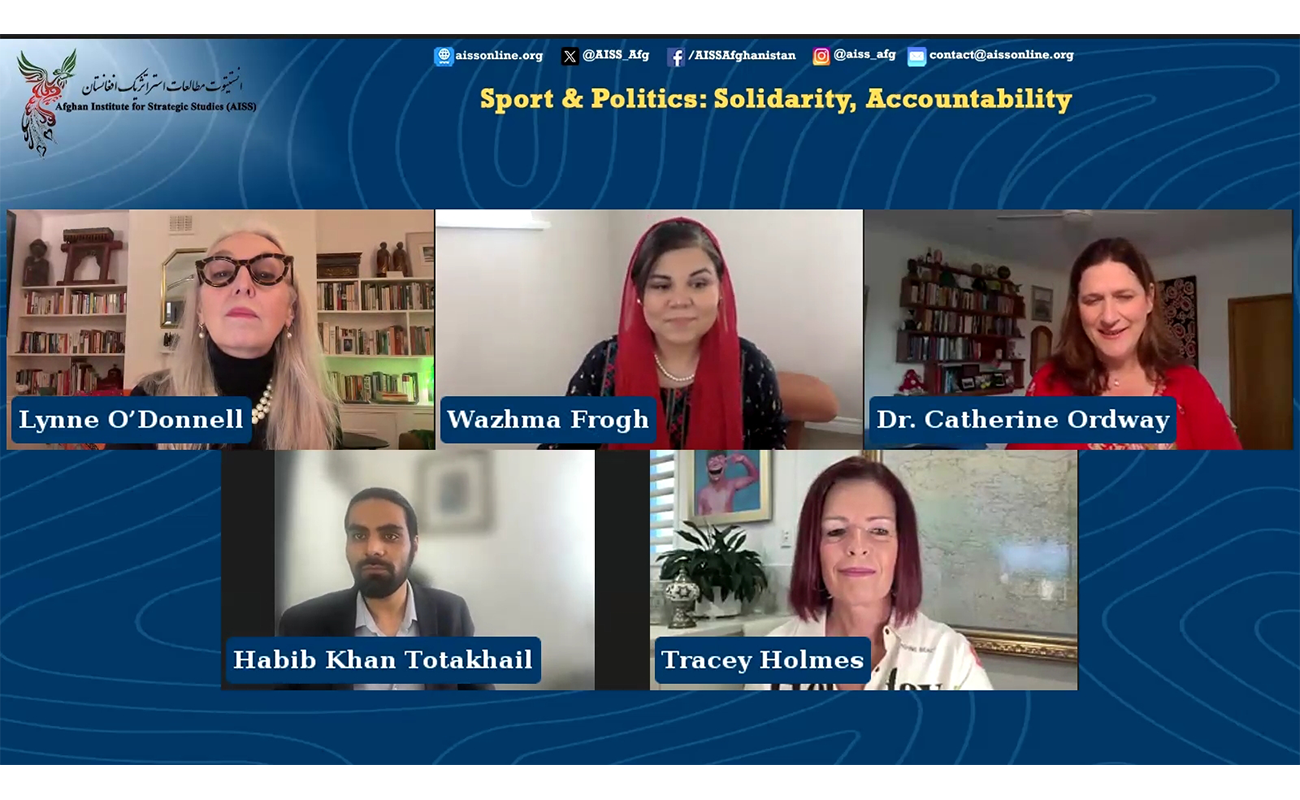Webinar on "Sports & Politics: Solidarity, Accountability"
On Friday, January 17, AISS hosted a webinar titled "Sports & Politics: Solidarity, Accountability," addressing Afghanistan’s Cricket Conundrum: Politics, Rights, and Global Responsibility. Speakers emphasized that the Boycott of the Afghan Cricket team transcends the game and focuses on upholding the dignity and rights of Afghan women. It is the duty of the international community, particularly the ICC, to oppose gender apartheid and promote equality for all.
The intersection of sport and politics has long been a contested space, but in Afghanistan, it has become a stage for cultural erasure and international posturing under Taliban rule. With the men’s cricket team continuing to compete internationally, the stark exclusion of women’s participation violates core principles of equality and justice. The Taliban have strategically leveraged cricket to project a facade of legitimacy. As moderator Lynne O’Donnell noted during the webinar, “The men’s team enjoys the privileges of international competition while blatantly ignoring ICC rules that mandate equal opportunities for women.”
Despite Afghanistan’s full membership in the International Cricket Council (ICC)—a status predicated on developing both men’s and women’s cricket—the complete absence of a women’s program has sparked outrage. Tracey Holmes, a veteran broadcaster, remarked, “The ICC must decide if it values integrity or convenience. By ignoring its own regulations, it tacitly condones gender apartheid.”
O'Donnell highlighted, “South Africa was ostracized from international sport during its apartheid era, which lasted for 50 years. Many South African athletes who lived during that time and couldn't test themselves at the international level have said that boycotts cut deep and were effective in sending a very loud message to the apartheid authorities that their actions were unacceptable. South Africa Sports Minister Gayton McKenzie urged the South African Cricket Board to consider boycotting its scheduled match against Afghanistan in the Champions Trophy tournament to send a message to the Taliban that their treatment of women is unacceptable. As a man who comes from a race that was not allowed equal access to sporting opportunities during apartheid, it would be hypocritical and immoral to look the other way today when the same is being done towards women anywhere in the world.”
The Taliban’s ban on women in sports epitomizes their broader agenda of erasing women from public life. Many Afghan women athletes, including the cricket team, have fled the country, finding themselves in exile with uncertain futures. Dr. Catherine Ordway, a sports academic, noted, “The ICC has the tools to enforce compliance. FIFA has intervened in similar scenarios by normalizing governance structures to uphold gender equality. Why hasn’t the ICC done the same?”
Panelist Wazhma Frogh, a human rights lawyer, underscored the psychological toll of such exclusions, stating, “Women’s participation in cricket is not just about sports—it’s about hope, visibility, and breaking barriers.”
Ordway also observed the Taliban's understanding of the sport's political significance: "Taliban is using the Afghan men's team as a kind of sports-washing opportunity to legitimize their regime. In the first week of their takeover in August 2021, before securing essential services, they prioritized controlling the Afghan Cricket Board. This speaks volumes about their desire to control the narrative and use cricket to project power."
Calls for a boycott of Afghanistan’s men’s cricket team have ignited fierce debate. Advocates argue that such actions would send a clear message about the consequences of suppressing women’s rights. Habib Khan Totakhail, a journalist and researcher, highlighted the ethical dimensions: “Allowing the men’s team to play while the women are silenced normalizes the Taliban’s narrative. It is imperative to recognize the role sport plays in shaping societal values.”
Adding a historical perspective, Ordway reflected, “Hypothetically, if a women’s group had taken control of one of the ICC’s other member nations and banned men from playing, the response would have been swift. The ICC would have been working overtime to resolve the issue. Why is that not happening now for Afghan women?”
The panel emphasized the ICC’s responsibility to uphold its own standards. As Holmes pointed out, “It’s time for the ICC to channel funding towards supporting Afghan women cricketers in exile. Their readiness to play reflects resilience and determination that the world must amplify.”
Holmes further explained, “The women themselves are not asking the ICC to directly confront the Taliban; they’re asking for the ICC to play by the rules. The ICC’s own regulations mandate that women’s cricket be developed in Afghanistan. Redirect the funds, support the women’s cricket program, and help them train and grow.”
The discussion also highlighted the broader implications of inaction. As Ordway observed, “Ignoring gender apartheid undermines the global fight for equality. Sport must be a force for change, not a vehicle for oppression.”
The discussion highlighted the urgent need for global accountability in addressing the plight of Afghan women under Taliban rule. Cricket has transcended its role as a sport—it is now a battleground for gender equality and human rights. The failure of the International Cricket Council (ICC) to enforce its own standards undermines the fight for justice and sends a dangerous message about the normalization of oppression. The ICC must act swiftly to redirect funds to support Afghan women cricketers in exile, allowing them the opportunity to train and compete. The Australian Cricket Board’s commitment is a model for others to follow. Ignoring this issue not only strengthens the Taliban’s oppressive narrative but also disregards the global principles of fairness and equality that sports should uphold. This is not just about cricket—it’s about supporting the dignity and rights of Afghan women. The international community, led by the ICC, has a responsibility to stand against gender apartheid and ensure that the spirit of equality extends to all athletes, regardless of gender. The time for action is now.

